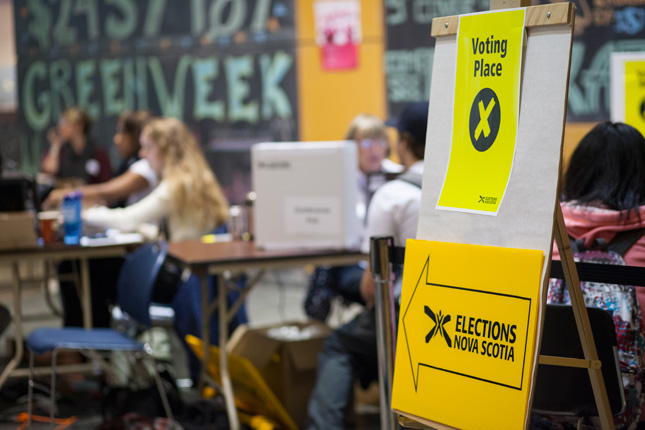Elections Nova Scotia

Voting for University and College Students
I haven't voted before and I don't think I'm registered to vote?
Between elections, you can check to see if you are on registered or whether your information is accurate by contacting Elections Nova Scotia at 1-800-565-1504 or TTY 1-866-774-7074. You will be asked to provide personal information, such as your date of birth, in order for Elections Nova Scotia to determine whether you are the elector wishing to check his/her information. For privacy reasons you can only check your own information.
During an election, you can see if you are registered or whether your information is accurate by contacting your local returning office. You will be asked to provide personal information, such as your date of birth, to determine whether you are the elector wishing to check his/her information. Elections Nova Scotia also has a line for those who are deaf or hard of hearing TTY 1-866-774-7074.
Register to Vote
Registration is a simple process. If you find that you're not already registered, you can download an application from this site or ask your returning office for an application and one will be sent to you. You can submit your completed form with ID via email, mail, or in person at your returning office during an election.
Or, you can register when you go to vote. While you don't need ID to vote, you will be asked for identification with your name and civic address (see acceptable identification) when you register. If you don't have identification, you may swear an oath and declare your name and address.
Where do I vote?
Most people vote in the electoral district in which they live. Students who live away from home while at university or college, may vote where they usually live when not at school or in the electoral district in which they live while at school, whichever they declare to be their residence. They may vote at a returning office, at an advance poll or on election day. If you have any questions, don't hesitate to contact Elections Nova Scotia or your local returning office.
I know I'm not on the Voters' List – can I still vote?
If your name isn't on the voters' list you are still eligible to vote. Simply come to the poll or returning office on election day, or any early voting opportunity, with ID that displays your name, and address. Acceptable identification includes an original piece of ID showing the voter's name and physical address (rather than a post office box number). (See list of acceptable identification).
If you do not have such identification, or that identification does not adequately reflect your residence, you must sign a declaration attesting to your identity and residence.
I want to vote but I know I won't be able to on election day – what do I do?
You have a few options:
You can go to any advance poll. Your returning officer will advertise all advance polls in your electoral district.
You can vote at your returning office or any returning office in the province on most days except Sunday.
If you still can't find a time to come vote, you can apply to vote by mail using a write-in ballot. Follow this link for details on how to apply on-line for a write-in ballot.
I don't feel informed enough to vote. I really don't have a position on 'the issues'.
Informed or not – everyone is affected by the results of elections. Consider the issues important to you. Take a moment and read up on Nova Scotia's registered political parties and where they stand on issues important to you.
Students attending school in Nova Scotia or at a Nova Scotian-based school
If you are a Canadian citizen who is 18 years or older as of election day, and you have resided in Nova Scotia for at least six months before the day that the election is called, then you are eligible to vote in the Nova Scotia provincial election.
The following conditions apply if you are studying at a school located in Nova Scotia, but live away from home.
If you are a post-secondary student from Nova Scotia but are studying in a different city from your home, you must vote in the electoral district that you consider your residence. This can be either the place where you live while at university/college OR the place in Nova Scotia where you lived prior to going to university and intend to return at the end of the school year. You can choose one or the other as your residence when you register to vote but not both.
If you are a post-secondary student from another province and you meet the eligibility requirements, you can vote in the Nova Scotia provincial election using your Nova Scotia residence as your address.
You can vote in one of several ways:
- on election day at your polling location
- at an advance poll
- by write-in ballot at the continuous poll at your returning office
- by write-in ballot at the out-of-district poll at any returning office OR
- by mailing in a write-in ballot
Eileen is a first-year student from Ontario. A Nova Scotia provincial general election is called for the electoral district where she lives in Antigonish while attending university. She is not an elector as she does not meet the six-month provincial residency rule.
William is from Digby but he lives in Halifax while attending university. He is an elector and may declare either the electoral district in which he lives in Halifax or in Digby as his residence.
Étienne is a third-year student from New Brunswick who has been living in Wolfville, Nova Scotia since starting their undergraduate studies. They are an elector and may vote from their Nova Scotian residence in the electoral district of Kings South.